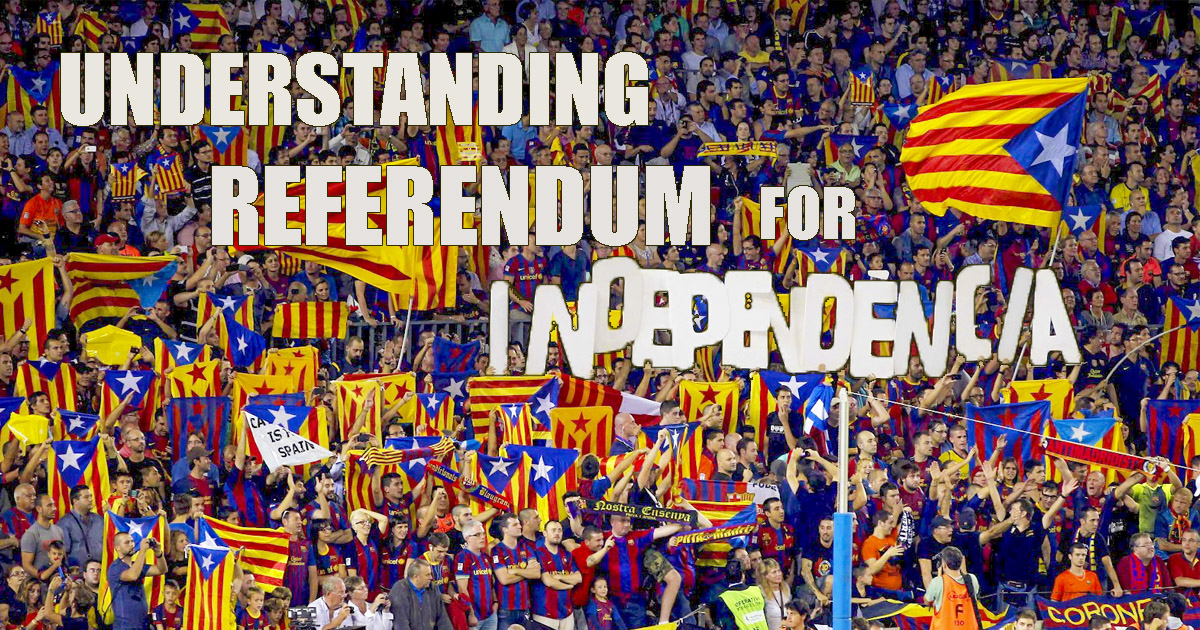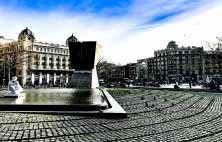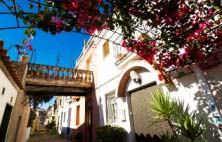The referendum and the solution to the conflict (1-O)
Currently, the number of independence supporters is at 38.6%, far from the 48.5% it once achieved, but it has the majority of parliament and has began the process of the breakup with Spain.
The legal bases to the illegal referendum
This September 2017, the Catalan Parliament has challenged the Spanish legislation by approving of two disconnection laws. The first is a Referendum Law, which regulates a referendum convened for 1 October 2017 (1-O) and second is a Law of Transition that regulates the legal loophole in event of a Yes victory.
According to its legal framework, the Catalan Government would declare its "immediate" independence from Spain if the Yes vote wins in the referendum. If the "No" vote wins, there will be new parliamentary elections.
The crux of the problem is that many Catalans do not recognise Spanish state laws as defending their interests.
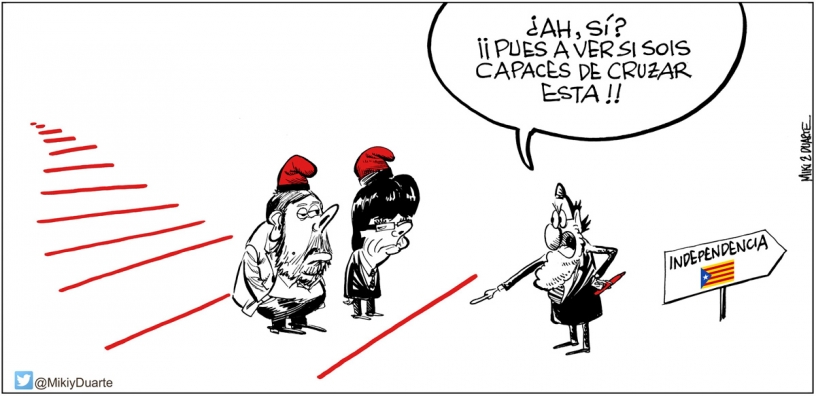
Will the referendum take place?
Rajoy's government promises not to give up on preventing the referendum and Puigdemont says that he has a plan A, B, C and D.
This September there has been escalated social and political tension about the conflict.
Rajoy has sent a letter to 947 local Catalan governments reminding them that enlisting locals to man the polling booths is against the law. On 8 September there was a total of 560 mayors who signed in favour of the referendum despite threats from the government.
The Guardia Civil have made 14 arrests of senior officials from the Generalitat and 41 records among which the Generalitat's Department of Economy, Ministry of Foreign Affairs and Department of Presidential Social Affairs. The detainees were released after 24 hours.
It is not known under what conditions the referendum will be held or whether it will be carried out.
If it is held, what will the result be?
If the referendum is held — and considering the following two facts — it is predicted that Yes will win the vote:
- Despite the majority of Catalans wanting to reach an agreed referendum, there is a relevant percentage of No voters that will not go to the ballot box because they do not want to legitimise the process. The participation rate is very difficult to predict.
- Large manifestations have an effect on the public opinion polls (an effect we will look at later in this article). During the next few weeks, potential voters are going to receive an electoral campaign in favour of Yes on the part of the two political parties involved recent grassroots manifestations — ANC and the Òmnium Cultural.
And if Puigdemont declares independence?
In the hypothetical case that the result is Yes, the president of the Generalitat would potentially pronounce the following statement according to approved legislation by the recent Parliament: "The independence of the Republic of Catalonia is declared". What effects would these words have on the legal reality of Catalonia? What would happen the following day?
According to linguists, there is a very peculiar type of speech called the declarative act. It is the act that the speaker changes by words, reality, just as a judge would when marrying two people. For a declarative act to have effects in reality, the person who executes the act should have the necessary authority to change said reality.
After this hypothetical unilateral declaration of independence, the jurisdiction of the courts of the Spanish State will continue to govern Catalonia, that at this time would be occupied by thousands of police sent by Rajoy. Such a statement would further intensify the political environment, make front pages and protests, but not have the capacity to change reality.
A unilateral referendum under the current forcefully restrictive conditions sent to Catalonia would not have the international recognition needed to make this change real. An agreed referendum is the only route to independence for Catalonia. Everything else has a symbolic value and sends a message but lacks legal effects on reality.
In the most extreme scenario, it would only take one particular extremist to surmise that as the state is never going to change the constitution to allow an agreed referendum, the only option left is a war of national liberation. Conditions such as those currently seen in Catalonia is how groups such as ETA formed. Catalonia also suffered from ETA over decades and we've already seen the results that this had, including death, suffering and no progress towards the independence of Euskadi.
The solution is Rule of Law, and a less politicised judiciary
In Catalonia, there is an unprecedented independence movement. Each time, there are more Catalans who think that the Spanish citizens are incapable of reforming the constitution in order to allow an agreed referendum. They conceive this democracy as fictitious. One where the political leaders are not separated from the judiciary. A state where the judiciary is heavily commandeered by politicians to strictly enforce Rule of Law is an authoritarian one. Judiciary systems are supposed to be independent from Parliament for this very reason, and even hold parliament to account. In Spain, corruptions cases have proven time and again political impunity from the judicial system.
The Rule of Law can also be very democratic. It provides tools of ever-improving laws that can be used to articulate common life of individual citizens. Manuela Carmena is currently the mayor of Madrid and has served as a judge for many years and commented in an interview on the programme la Sexta, el Intermedio:
Criminal law cannot be applied when it expects to extend to a social group that want to express their ideas. Applying the Criminal law does not make a change. Spanish democracy is in a crisis of growth that is only to be combated in one way: with more democracy.
In the following video (subtitles in English) you can watch an interview made by “Gran Wyoming” to the mayors of Madrid and Barcelona. It gives some interesting reflections about the solution to conflict.
The two mayors think that the Spain's strict and unchanging stance on the constitution are remnants from the Franco period — dirty state wars and undemocratic behaviours. They are right to think this, especially by analysing political and social events that have occurred over the last 10 years, which we also detail in the second and third parts of this article.
Contributors to the Phenomenon
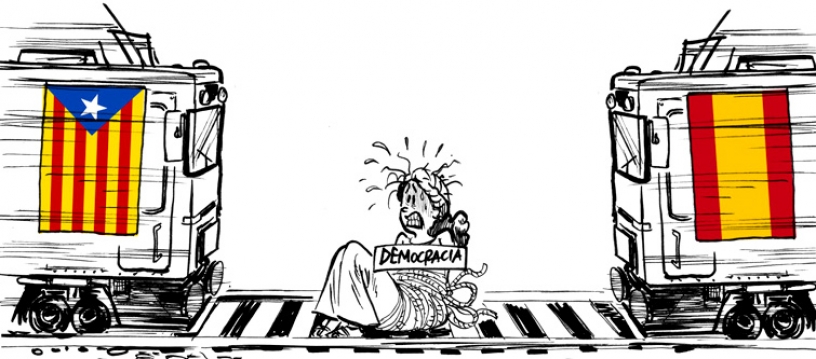
To understand the evolution of the feelings of independence over time, it is necessary to know prior: (1) The most relevant political events; (2) The mass protests carried out; (3) The parties and civil organisations that have taken part.
Let’s take a look at each of those:
The political events
The political and economic context is key to evolution of the pro-independence sentiment. We focus our attention on these 10 political events that are explained more later on. In the brackets, we show the percentage of support for independence:
- Statute and Referendum. June 2006 (14.9%)
- Beginning of the economic crisis. July 2008 (16.1%)
- Beginning of the non-official municipal referendums . September 2009 (21.6 %)
- Judgement of the Tribunal Constitution. June 2010 (24.3 %)
- Catalan Parliamentary elections. November 2010 (25.2%)
- ‘Partido Popular’ party returns to Spanish government. November 2011 (28.2 %)
- Catalan elections. November 2012 (44.3 %)
- Beginning of the most serious case of corruption in Catalonia. Julio 2014 (45.3%)
- 9-N referendum. November 2014 (45.3 → 35.2 %)
- Catalan elections. September 2015 (41.1 %)
The mass protests
The Independence Movement is a popular and democratic movement. It's the result of a large process in which social mobilisation has played a fundamental role. The following graph shows the evolution of the participation in the protests carried out on the National Day of Catalonia (11 September) known in Catalan as ‘La Diada’. You can see that the figures of participation given by the Guardia Urbana (City Police) (blue line) never coincide with those of the Delegation of Spanish Government in Catalonia (pink line). More realistic participation values have to be searched for and are found in statistical studies. The graph shows in grey the estimation of Llorenç Badiella, director of Applied Statistics Services at the Universitat Autònoma de Barcelona.
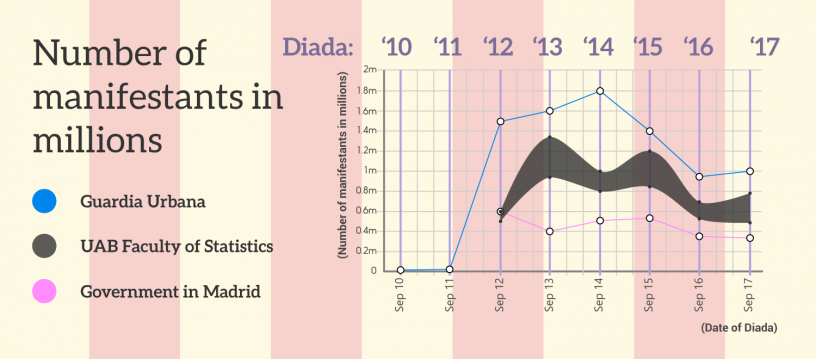
The parties and organisations
The main parties that have been mobilised by independence are:
- CiU, CDC and PDECat. Convergència i Unió (CiU) was created in 1978 as a partnership of two central-right, nationalist and liberalist parties: Convergencia Democràtica de Catalunya (CDC) and Unió Democratica de Catalunya (UDC). Since 2012, CDC made a turn towards the Independence Movement that provoked a crisis between the two partners. In the middle of 2015, the two parties separated. In May 2016, their members voted to form a new party to better confront the cases of corruption and they created Partit Demòcrata Europeu Català (PDECat).
- ERC (Esquerra Republicana de Catalunya). Created in 1931, The Republican Left of Catalonia is a central-left and pro-independence party, with presence across the so-called Catalans Countries (Catalonia, Balearic islands and Valencia region).
- CUP (Candidatura d’Unitat Popular). Created in 1986. Far-left, assembly-based and strongly pro-independence, especially in the municipal environment.
Two organisations stand out as drivers of the independence process:
- Òmnium Cultural (OC). Created in 1961, this pro-independence non-profit organisation was created to protect and propel the language, culture and rights of Catalonia.
- Assemblea Nacional Catalana (ANC). Created in 2012 as a result of municipal consultations about independence (between 2009-2011), it is a non-profit organisation with the objective to achieve — in a democratic and peaceable manner — independence for Catalonia.
- The National Pact for the Referendum was constituted on 23 December 2016, proposed by the Parliament of Catalonia. It has prepared a manifesto in favour of the consultation to which more than 4,000 entities have adhered, among these are secessionist parties, trade unions such as UGT and CCOO and more than 400,000 people.
If you come to visit the capital of Catalonia, we will help you to find the best long term rental barcelona. We offer apartments of different types, renovated and well furnished in all areas of Barcelona!
The evolution of support for independence
The Centre d’Estudis d’Opinió (CEO) of the Generalitat of Catalonia made a quarterly opinion poll over 10 years with the following closed question:
“Do you believe that Catalonia should be…? (a) A region of Spain; (b) An autonomous community of Spain; (3) A state within Federal Spain; (4) An independent state.”
The following graph shows how it has evolved during the last 10 years regarding the percentage of Catalans that want an independent state. In the graph you can see the main political and social events that have influenced public Catalan opinion.
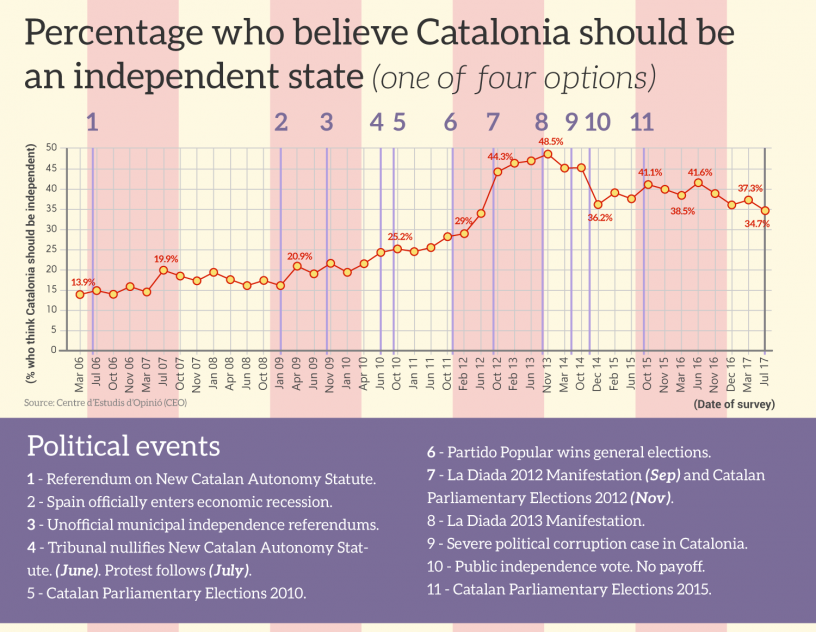
We can distinguish at least two time periods in the development of pro-independence in Catalonia:
1. The Emerging Stage (2009 – 2011) in which the Independence Movement went from 16.1% to 29%. We find out that this support comes from grassroots and the left. At this stage, there are actively mobilised civil entities such as Ómnium Cultural, Coordinator of Consultations for Independence (predecessor of the ANC) and political parties.
2. The Development Stage (since 2012). The Independence Movement grows strongly and reaches historic peaks. From 2012, mass protests on the National Day of Catalonia on the 11 September have been carried out. The polls by CEO show a maximum point of 48.5% at the end of 2013, showing a drastic increase from 2011 to 2012, when it goes from 28.2% to 44.3% in just a few months.
The key facts to help understand the Independence Movement
In this chapter we analyze how different social and political events influence Catalan public opinion and we provide the key facts to understand the sentiment of independence in Catalonia.
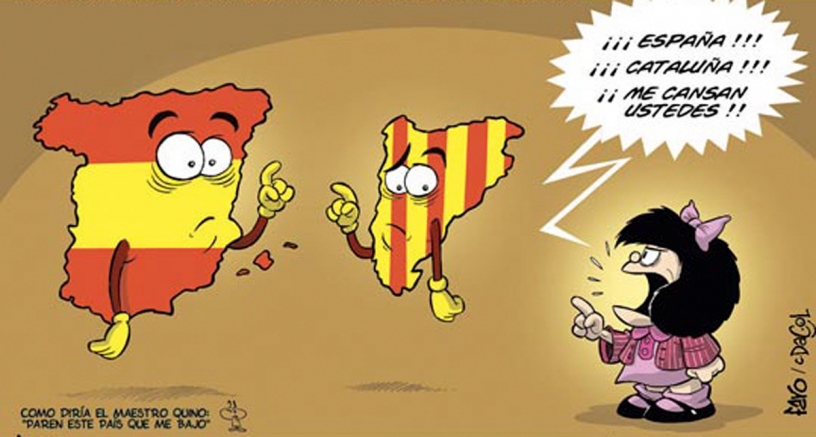
1. Statute and Referendum. June 2006 (14.9%)
The Catalan Statute of Autonomy is the basic institutional regulation of Catalonia. This statute regulates the autonomy and margins of self-government of the territory. On 10 May 2006, the General Courts of Spain approved a cut down version of the Statute of Autonomy that had previously been approved by a majority in the Catalan parliament.
The centre-left party — El Partido Socialista Obrero Español (PSOE) — used to govern Spain with José Luis Zapatero as president. During that time, it is estimated that the right-wing opposition — Partido Popular (PP) — invested €500,000 in a media campaign against the Statute (written press, radio and Internet) and gathered 4,000,000 signatures, wearing down the Spanish Government and forcing them to face the Spanish public.
On 18 June the same year, Catalans voted in a referendum approving the Statute. Results showed 74% of votes approved it with a turnout of 48.8%. At this time, 14.9% of Catalans supported independence.
The new statute aimed for: (1) The formal recognition of Catalonia as having a differentiated national reality; (2) The increase of self-governance; (3) The establishment of the foundation of a new finance system to improve what many Catalans consider to be an excessive fiscal deficit.
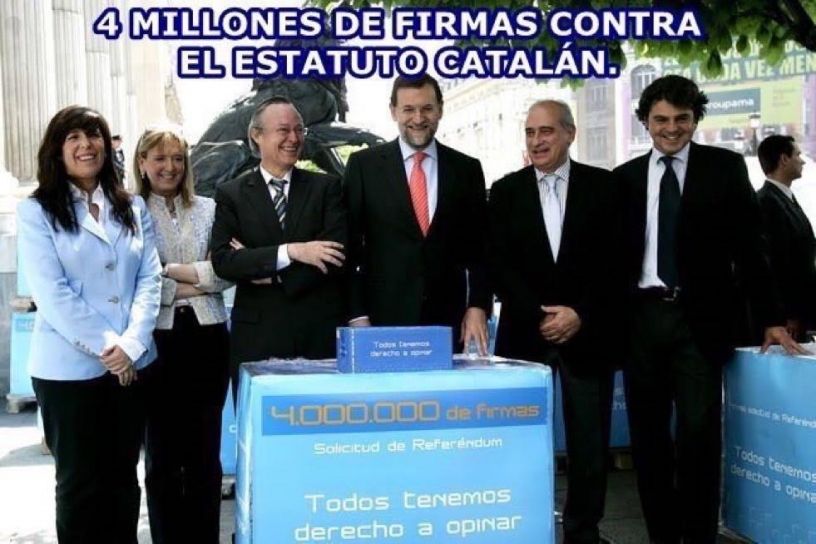
2. Beginning of the economic crisis. July 2008 (16.1%)
Between 2009 and 2015, the Catalan centre-right government(CiU) cut more social spending than any other autonomous community. During these seven years, the cuts applied by the Generalitat to health, education and other social areas was 26.6%. The social discontent generated by high levels of unemployment and wage cuts have resulted in looking to more attractive political options.
It is a general feeling between the Catalans that there are too many taxes paid to the Spanish Hacienda (Tax Office) that do not come back to Catalonia. The Wall Street Journal confirmed in their article Why Spain won't reform from April 2012 that the Catalan–Spanish fiscal balance was abusive:
"...every year from 1986, an average of 9% of the GDP of Catalonia in net terms, has left the region to be redistributed through Madrid. In Spain, only the Balearic Islands renounce a greater part of their annual production. In no other place in Europe or North America are there inter-state transferences of this magnitude"
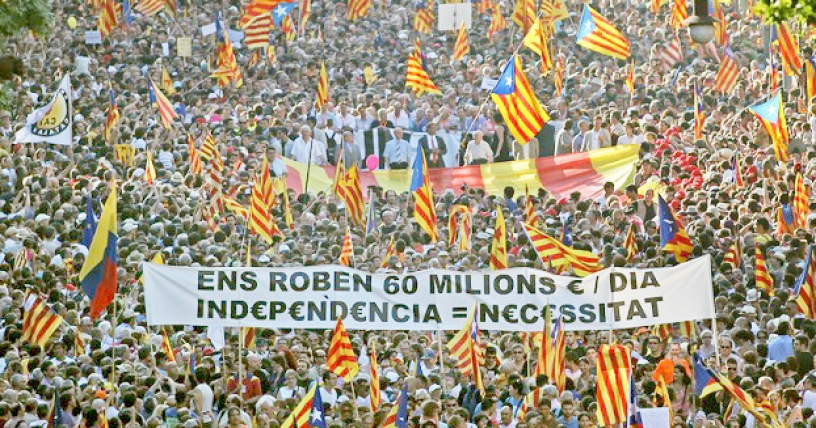
3. Non-official municipal referendums. September 2009 (21.6%)
The pro-independence takeoff started at the beginning of 2009 with the non-official municipal referendums. At this time, the Independence Movement had just 21.6% of the electorate and 23 members of parliament (ERC).
Between 2009 and 2011 there were almost 900,000 Catalans that voted in the 553 municipal consultations about self-determination which began in Arenys de Munt and ended in Barcelona.
4. The judgement from the Constitutional Court. June 2010 (24.3%)
The Partido Popular (PP) directed by Mariano Rajoy filed a report on 21 July 2006 — an appeal of unconstitutionality of the Catalan Statute. Four years later, 28 June 2010, the Constitutional Court emitted a judgement declaring 14 unconstitutional articles. This court, composed of 12 members, 4 from Parliament, 4 from the Senate, 2 from the Government and 2 from the General Council of the Judiciary.
On 10 July 2010, the largest protest in Catalan history was attended by 1.1 million people. This protest was not just simply of pro-independence characteristic and almost all of the organisations commented so far attended (except for ANC, which did not exist). At this time, CiU did not qualify as a pro-independence party. The polls from the Centre of Opinion Studies indicate that the pro-independence sentiment was at about 24.3% of the electorate.
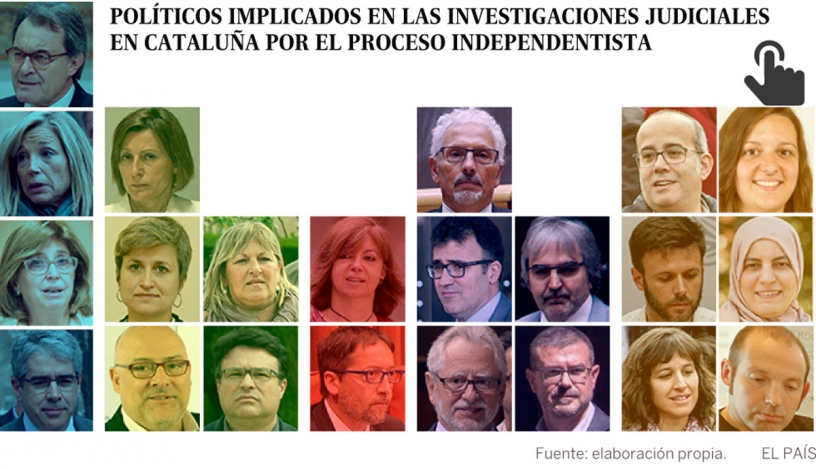
5. The Catalan Parliament Elections. November 2010 (25.2%)
In the Parliament elections on 28 November 2010, CiU won (they were still not pro-independence) and the number of pro-independence members of parliament decreased from 23 to 14. During the protests on National Day of Catalonia (La Diada) celebrated two months earlier than the elections, only 9,000 people participated.
In these elections, civil entities such as Òmnium Cultural and the Coordinator of Consultations for Independence (predecessor of the ANC) participated. It was around this time that the right to decide started to appear with more notoriety in Catalan public debate.
6. Partido Popular returns to Spanish government. November 2011 (28.2%)
On 20 November 2011, the general elections were carried out in Spain and Partido Popular (PP) obtained an important absolute majority in Congress. The PSOE suffered the wear of its government through the management of a strong financial crisis.
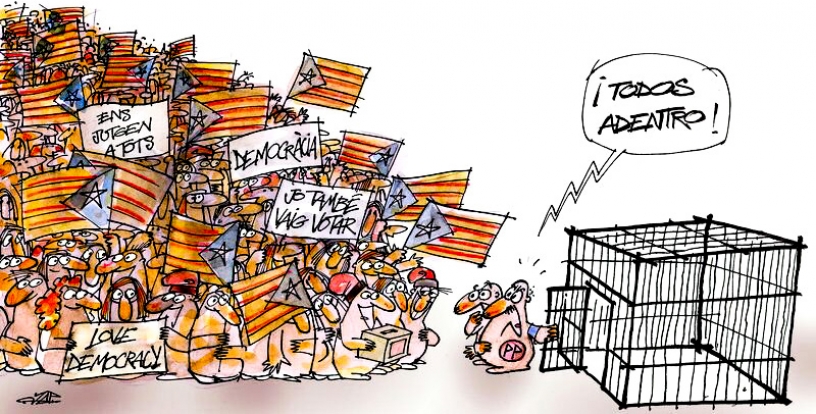
7. La Diada 2012. September (34% → 44.3%)
On June 2012, the percentage of independence supporters was 34% and on October 2012 it was 44.3%. This is an increase of 10.3% in just four months. We can clearly see an effect from these protests in the public opinion polls, producing a collective feeling of euphoria for independence supporters.
With regards to Spain's Governing system, the feeling of pro-independence now draws strongest public opinion, much to the detriment of other options in the polls such as a Catalan state integrated in a Spanish Federal system.
On July 2012, the Catalan parliament passed a Fiscal Pact proposal inspired by the economic agreement in the Basque Country. This proposal brought a dilemma to Mariano Rajoy's government, which was either there is a fiscal agreement or a journey towards an independent Catalan state would begin. The PP government did not want to negotiate any aspect of the Catalan proposal in any way. Their strategy of using the judicial system over Catalan politics apparently granted him clear electoral benefit in Spain, yet the support of his political party in Catalonia is a clear minority.
8. Catalan Elections. November 2012 (44.3%)
On 26 November 2012, much-anticipated Catalan elections took place. CiU won with 48 seats (lost 14). ERC obtained 21 members of parliament and CUP entered the chamber with three seats. On 23 January 2013, the Catalan parliament made a declaration of the right to decide and sovereignty.
In the graph in section 12, we can see the evolution of pro-independence seats and the right to self-determination voted into Catalan parliament. The graphic that represents the result of the 2012 elections shows the seats of CiU — drawn in blue — who presented their campaign on a platform of right to self-determination, not pro-independence.
9. La Via Catalana. September 2013 (historic peak of 48.5%)
La Via Catalana (The Catalan Way) towards independence was a 400km human chain organised by the Assemblea Nacional Catalana (ANC) on National Day of Catalonia (La Diada) on 11 September 2013. It is estimated over one million people participated.
On that date, pro-independence support reached a historic peak of 48.5% according to the November poll of the same year.
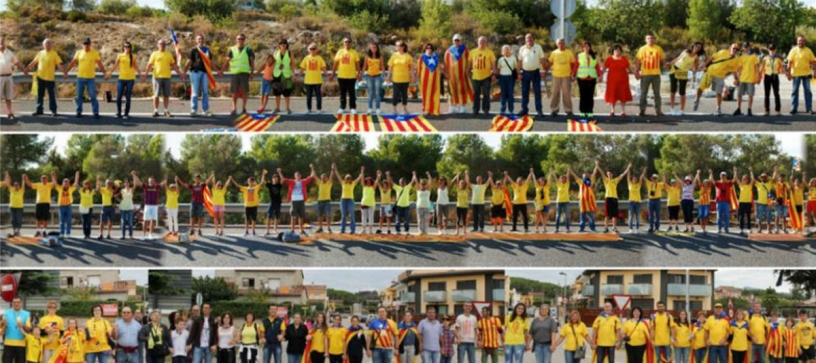
10. Beginning of the most serious case of corruption in Catalonia. July 2014 (45.3%)
Jordi Pujol was president of Catalonia for 23 years (1980 – 2003) and won seven consecutive elections. On 25 July 2014 he acknowledged in a statement sent to various medias that he had hidden public finances for 34 years in "money located abroad".
Currently, his family are linked with different cases of corruption and ownership of large current accounts in different tax havens. Pujol was part of the CDC party, which decided to relaunch in 2016 as another party called PEDCat.
11. Referendum 9-N. November 2014 (45.3% → 36.2%)
Trying to give the possibility of having an official referendum and after many years of large social movements in favor of a referendum being carried out, the Catalan Parliament organised an electoral referendum on 9 November 2014 (9-N).
The referendum was carried out despite refute by the PP government and was suspended by the Constitutional Court. The referendum asked "Do you want Catalonia to be a state?" (yes/no) and "If yes, Do you want Catalonia to be an independent state?" (yes/no).
It is estimated that 37% of the electoral census voted, more than two million people. Of those, 81% supported state independence, 10.07% a federal state in Spain and 4.45% were against change.
It seems that the referendum has had a negative effect on the public opinion in favour of independence. One month after the referendum, according to the polls of the CEO, they pronounced Catalans in favor of independence decreased by 10%, from 45.3% to 36.2%. Perhaps a result of by forlorn fatigue.
12. Catalan Elections. September 2015 (41.1%)
On 27 September 2015, the elections were convened with as a plebiscite on independence, due to the impossibility, again, of carrying out a referendum.
Two weeks before the elections and surprisingly, around one million people flocked to the protests on National Catalan Day (La Diada) on 11 September. This had a positive effect on the opinion polls by the CEO, because from June to October 2015 independence support rose from 37.6% to 41.1%.
Pro-independence parties obtained 47.8% of votes and a majority in parliament. Citizen participation was 77.4% of the electoral census.
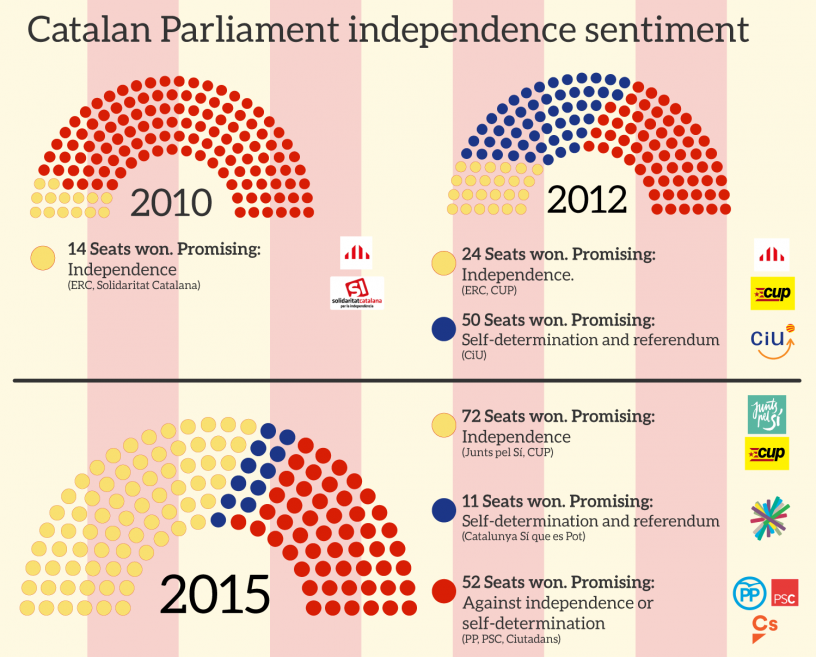
Videos and more resources about the topic
To better illustrate the article we went out to the steets and made these two videos.
Catalan Referendum 1 October - Street Poll
What are the opinion of foreigners about the referendum?
-
 Catalan referendum: 1 in 3 foreigners in favour This is what foreigners residing in Barcelona think about the Referendum. 1 in 3 are in favour....
Catalan referendum: 1 in 3 foreigners in favour This is what foreigners residing in Barcelona think about the Referendum. 1 in 3 are in favour....
Complete graph about the Catalan feeling of independence
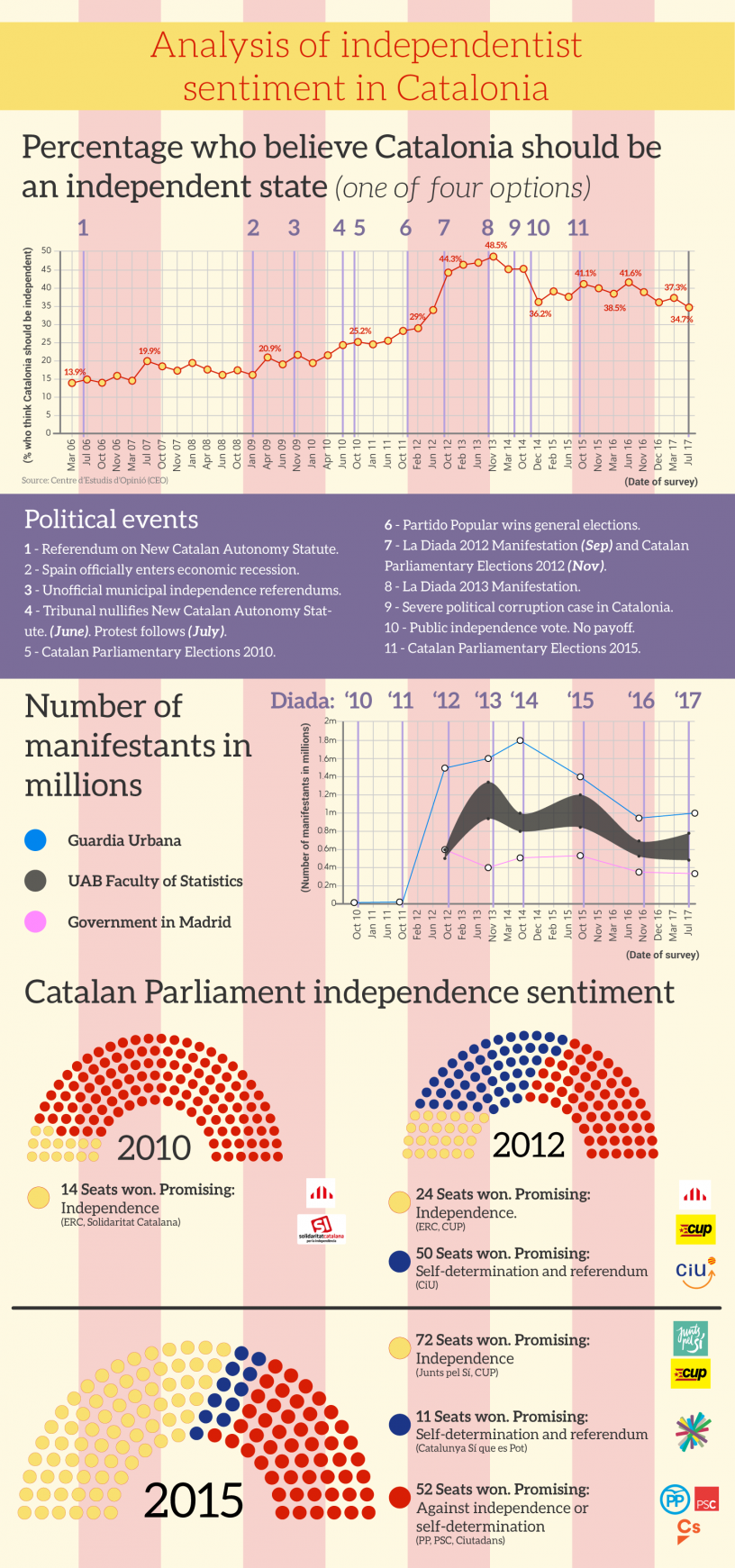
Do you want to share this graph on your webpage or blog?
Simply copy and paste the following:
Excursions in Barcelona
To make the most of Barcelona and fill your trip with unforgettable experiences and emotions, we offer you the excursions through the Catalan capital organized by our friends - the GetYourGuide team. Choose your excursion and fall in love with Barcelona:

